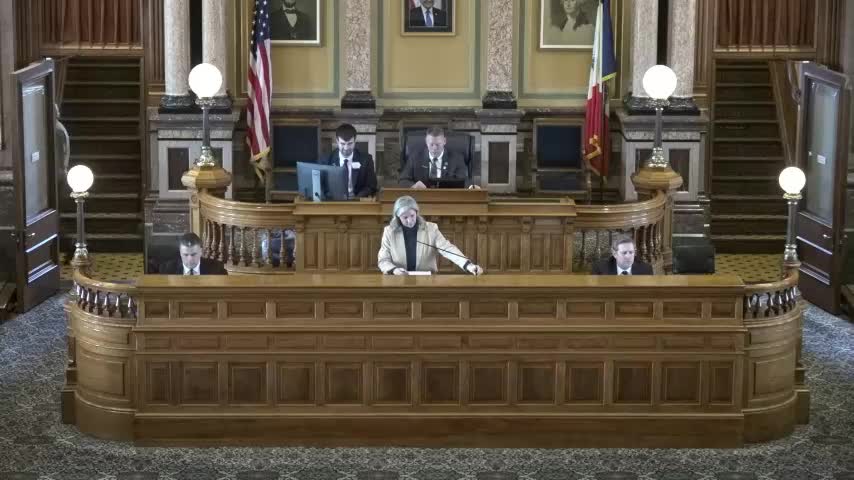House conducts first readings on dozens of bills; measures referred to standing committees
Get AI-powered insights, summaries, and transcripts
Subscribe
Summary
The House of Representatives read dozens of House files in a session that included first readings and committee referrals across education, health, labor, elections and other policy areas; no final floor votes were taken.
DES MOINES — The House of Representatives conducted first readings for dozens of bills during its floor session on a date shown in the transcript as not specified, introducing measures that span education, public health, elections, labor and utilities. Most bills received first reading and were referred to standing committees for further consideration; none were adopted or defeated on the floor at this session.
The session opened with a prayer and the pledge and moved quickly into the correction of the journal and the introduction of House files. The clerk read bill titles and short summaries aloud; where indicated, bills were marked “not ready for commitment,” had amendments referred, or were placed on the calendar or counter for future consideration. Committee referrals reported in the reading included the committees on Education; Appropriations; Health and Human Services; Judiciary; Labor and Workforce; Public Safety; State Government; Transportation; Ways and Means; Commerce; and Local Government.
Highlights from the introductions include education-related measures such as House File 271 (establishing a comprehensive transition and postsecondary scholarship program) and House File 272 (an advanced dyslexia specialist endorsement competitive scholarship program), both read by the clerk and noted as having amendments referred to or otherwise tied to the appropriations process. Other education bills included House File 273 (student access to personal electronic devices in school), House File 274 (obscenity exemptions for public libraries and educational institutions) and House File 275 (modifying enrollment provisions for a statewide preschool program).
Health, safety and human services measures introduced included House File 276 (creating a study committee to consider a state training school for females under 18), House File 277 (removing birthing centers from the meaning of institutional health facility), and House File 299 (provisions of information relating to immunization exemptions). Several health- and provider-related bills placed on the counter included House File 300 (physician assistant licensure compact) and House File 309 (Department of Inspections and Appeals licensing and deficient practices at nursing facilities).
Labor and workforce items introduced included House File 281 (repealing provisions concerning rights related to labor organization membership, as read in the transcript) and House Files 282–283 (eligibility for unemployment benefits for strike participants and a proposed increase in the state minimum wage). Election- and state-government-related introductions included House Files 286–291, covering campaign contribution limits, a bill described as “making election day” (text not specified), transfers of vocational rehabilitation services, and registration of eligible electors from state records.
Other measures included bills on utilities and climate (House Files 302, 304), banking governance (House File 311), public-safety funding rules for emergency medical services (House File 307), and requirements for regent institutions’ financial disclosures (House Files 295–296). The clerk also read bills addressing adoption investigations (House File 314), school budget adjustments after natural disasters (House File 315), career education expansions (House File 316) and cost-sharing for supplemental and diagnostic breast exams (House File 318).
The transcript records committee referrals, calendar placements and counter placements for each introduced bill but does not record any final floor action on these measures during this session. Next steps for the items are ordinary committee consideration, amendment and scheduling according to the rules of the House.
Ending: The floor recessed after the introductions. No roll-call votes on substantive measures were recorded in the provided transcript.
